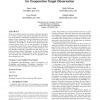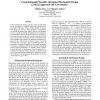2404 search results - page 382 / 481 » Benevolent Agents in Multiagent Systems |
JANCL
2007
14 years 10 months ago
2007
Qualitative coalitional games (QCGs) were introduced as abstract formal models of goal-oriented cooperative systems. A QCG is a game in which each agent is assumed to have some goa...
ATAL
2009
Springer
15 years 4 months ago
2009
Springer
Decentralized partially observable Markov decision processes (Dec-POMDPs) constitute a generic and expressive framework for multiagent planning under uncertainty. However, plannin...
ATAL
2005
Springer
15 years 3 months ago
2005
Springer
Multi-agent problem domains may require distributed algorithms for a variety of reasons: local sensors, limitations of communication, and availability of distributed computational...
AAAI
2010
14 years 11 months ago
2010
In many multiagent settings, a decision must be made based on the preferences of multiple agents, and agents may lie about their preferences if this is to their benefit. In mechan...
104
click to vote
AAMAS
2005
Springer
14 years 10 months ago
2005
Springer
One of the most difficult problems in Multi-Agent Systems (MAS) involves representing the knowledge and beliefs of an agent which performs its tasks in a dynamic environment. New p...


